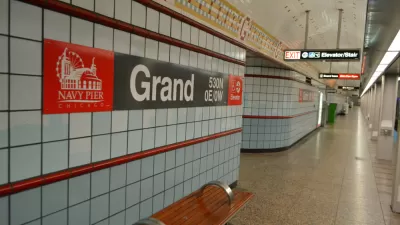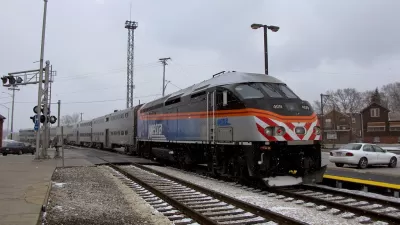The Chicago Transit Authority (CTA) in October proposed a $1.75 billion operating budget that will make it cheaper to ride transit in the Windy City.

The Chicago Transit Authority (CTA) recently proposed a $1.75 billion operating budget "that takes multiple steps to ensure that public transit remains a crucial part of the city’s continuing recovery from the COVID-19 pandemic," according to a press release dated October 21, 2021.
The budget would allow the CTA to maintain all existing bus and transit service while also proposing a "major realignment of fares and passes to better meet changing ridership patterns due to the COVID-19 pandemic," according to the press release.
The press release notes that ridership on CTAA grew throughout 2021 but still falls short of pre-pandemic levels (a pattern that is repeated in other U.S. cities, like New York City, for example). The reduced costs of fares and passes are thus intended to lure back riders who are working on flexible schedules or dealing with the economic shocks of the pandemic.
"CTA is lowering its 30-Day Full Fare pass price to $75 (from $105) and the 30-Day Reduced Fare pass price to $35 (from $50)," according to the press release. "Additionally, the CTA-Pace 7-Day pass will be reduced to $25 (from $33) to reflect the $5 premium for the shared pass with Pace Suburban Bus."
The question of how to lure riders back from catastrophic declines that date back to the earliest days of the pandemic looms over the transit planning community. Ride-hailing companies are facing their own unique problems, potentially creating an opportunity for public transit to win back some of the market share it's lost to companies like Uber and Lyft over the past decade.
An article by Brody Ford provides more details about how the CTA hopes reduced fares will respond to the pandemic's influence on transit in Chicago.

Planetizen Federal Action Tracker
A weekly monitor of how Trump’s orders and actions are impacting planners and planning in America.

Maui's Vacation Rental Debate Turns Ugly
Verbal attacks, misinformation campaigns and fistfights plague a high-stakes debate to convert thousands of vacation rentals into long-term housing.

Restaurant Patios Were a Pandemic Win — Why Were They so Hard to Keep?
Social distancing requirements and changes in travel patterns prompted cities to pilot new uses for street and sidewalk space. Then it got complicated.

In California Battle of Housing vs. Environment, Housing Just Won
A new state law significantly limits the power of CEQA, an environmental review law that served as a powerful tool for blocking new development.

Boulder Eliminates Parking Minimums Citywide
Officials estimate the cost of building a single underground parking space at up to $100,000.

Orange County, Florida Adopts Largest US “Sprawl Repair” Code
The ‘Orange Code’ seeks to rectify decades of sprawl-inducing, car-oriented development.
Urban Design for Planners 1: Software Tools
This six-course series explores essential urban design concepts using open source software and equips planners with the tools they need to participate fully in the urban design process.
Planning for Universal Design
Learn the tools for implementing Universal Design in planning regulations.
Heyer Gruel & Associates PA
JM Goldson LLC
Custer County Colorado
City of Camden Redevelopment Agency
City of Astoria
Transportation Research & Education Center (TREC) at Portland State University
Jefferson Parish Government
Camden Redevelopment Agency
City of Claremont





























